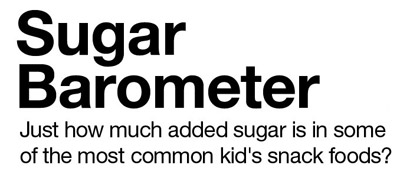Mums In The Dark About Sugar Content

Mums In The Dark About Sugar Content
The majority of Australian mums have little to no understanding of how much sugar their children should be consuming, according to a new study announced.
The research, undertaken by children's milk flavouring brand, Sipahh straws, to ascertain parents knowledge of sugar consumption, shows that 94 per cent of Aussie mums are unclear of the recommended daily amount of added sugar* their child should be consuming.
The World Health Organisation (WHO) advises that two to 10 year olds should receive no more than 13 grams of added sugar per day** (equating to 3 teaspoons) however the research study found that parents are giving their children over 10 (10.4) teaspoons per day, including sugar laden foods such as ice-creams, sweet biscuits and soft drinks.
The Sipahh research conducted amongst mothers with children aged between two and 10 years, found that Aussie mums appear to be aware of the dangers of giving their kids too much sugar, however nearly half (48%) are still feeding their kids almost triple the recommended amount of added sugar per day, despite their best intentions.
So just what is causing this misunderstanding about sugar?
Kate DiPrima, Dietician & Infant Nutritionist, who was involved in the research analysis, claims there needs to be clearer packaging guidelines for parents on the added sugar content in kid's snack foods – a key reason for the lack of awareness amongst mums.
'There is still confusion between healthy natural sugars, such as those found in fruit (fructose) and plain milk (lactose), and added sugars (often in the form of sucrose, or table sugar). Parents are trying their best to monitor how much sugar they give their kids, but it is a balancing act. Despite their best intentions, there needs to be more solutions available to make it easier for mums to detect the good from the bad sugars," she said.
'Many healthy foods contain natural sugars including milk, fruit and some vegetables, so it's important to ensure there is a balance. These core foods provide essential nutrients such as calcium, protein and fibre, in addition to a relatively small amount of natural sugars.
Many foods with added sugars that are marketed towards children such as biscuits, cordials and fruit alternatives are nutrient poor - providing nothing more than excess kilojoules," Ms DiPrima added.
'Parents face a tough challenge when it comes to portion controlling sugar for their kids. There is so much confusion as to what is a suitable food to choose for their children. Some parents are removing foods such as yoghurt and fruit from their children's diets for fear of the sugar, not realising the nutrient loss this would cause," she continued.
Ms DiPrima encourages parents to choose core foods that provide nutrients essential for growth, including milk, fruit, vegetables and lean meats – and to portion control snack foods with added sugars and little or no nutrients, to avoid any risk of excessive weight gain.
MORE



